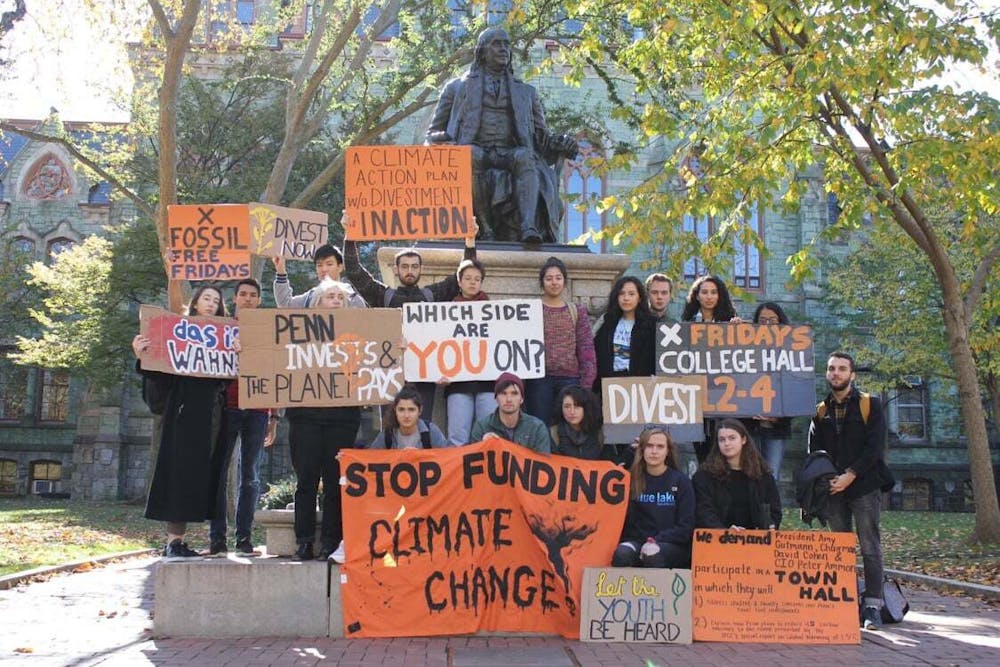
On the climate front, Penn seems to be making big moves: On April 7, the University's administration released an email to the Penn community outlining Penn’s goal of achieving net-zero emissions within the endowment by 2050. Penn is once again acknowledging Fossil Free Penn’s stance that Penn’s investments have climatological consequences — that our endowment has the power to act against the forces that cause climate change instead of funding them. At the surface level, the new commitment looks like serious climate action, but the face of this plan — Penn’s “net-zero endowment” goal — neglects demands from students to divest our endowment from fossil fuels.
The University wants to reduce the net greenhouse gas emissions from our endowment investments to net-zero by 2050. This is 20 years later than the recommendations from the United Nation's Intergovernmental Panel on Climate Change’s 2018 report, which suggests by 2030 the climate crisis’ catastrophic effects will largely be irreversible.
This plan ensures that Penn can continue to fund fossil fuel corporations and other greenhouse gas-emitting industries. Penn plans to reach their net-zero goal by waiting for companies they invest in to reduce their emissions. The University also plans to maintain investments and make new investments in companies that have “low or improving carbon footprints.” Many environmentally destructive companies technically meet these criteria, like oil giants BP and Exxon Mobil, which both have hollow plans in place to reduce their emissions. However, oil companies’ reductions in emissions are meaningless because their business models rely on selling fossil fuels. Selling any amount of fossil fuels is a recipe for further climate disaster. In order to avoid climate catastrophe, 80% of fossil fuel reserves must not be extracted or burned. Penn’s plan is not worthwhile if its investments actively help the deadly fossil fuel industry stay afloat.
The most significant failure of this plan is the strategic way Penn calculates emissions. Their plan conveniently omits Scope 3 — or indirect — emissions, which account for 90% of all fossil fuel companies’ emissions. Scope 3 includes all of the emissions from oil, gas, and coal that fossil fuel companies sell to be burned downstream. On the other hand, Scope 1 and 2 emissions account for the emissions that result from using company cars or purchasing electricity for an office building (see diagram). This same scheme allows fossil fuel companies to claim they will reach net-zero emissions by 2050 while still ramping up exploration for new oil and gas reserves. Fossil fuel producers are responsible for 71% of greenhouse gas emissions, so Penn’s plan for a net-zero endowment is fraudulent. By not addressing 90% of emissions from the fossil fuel industry — the world’s largest greenhouse gas emitter — Penn's "net-zero" plan is disingenuous and ineffective.
Penn also plans to use shareholder engagement to reduce its endowment’s emissions. Shareholder engagement — the idea that Penn can use their position as a company’s investor “as a force for change” — has a history of being unsuccessful. Not one of the top fossil fuel companies has committed to keeping fossil fuels in the ground, despite 160 shareholder resolutions filed from 2012 to 2018. There is nothing Penn’s “engagement” can do to convince an oil company to stop selling oil. Penn also mentions carbon offsets as a method to reduce emissions, but academic research suggests that these offsets have little to no long-lasting carbon-reducing effects.
To truly combat the catastrophic effects of the climate crisis, Penn needs to completely divest from the fossil fuel industry. Divestment is the best solution to ensure Penn’s endowment is not funding climate change and its violent effect on humans. Divestment also removes Penn’s contribution to the non-climate change-related atrocities of the fossil fuel industry, like its destruction of Indigenous land, perpetuation of high rates of sex trafficking, and inciting of rare cancers and health disparities in primarily Black and Indigenous communities (including Penn’s South Philadelphia neighbors on the fenceline of the Philadelphia Energy Solutions refinery).
For over seven years, FFP has fought for the University's administration to divest from fossil fuels and publicly rebuke the industry’s violence. We have submitted multiple divestment proposals and have tried on countless occasions to have meaningful conversations with the administration, to no avail. When formal requests with the University failed, we held non-violent direct actions. In 2019, FFP sat in front of President Amy Gutmann’s office nearly every Friday afternoon from September to March, halting only due to the COVID-19 shutdown. In November of 2019, we even shut down the fall Board of Trustees meeting. Penn’s new plan is a clear response to student activism, but, as they know, it is not what we have been demanding. Penn is not listening.
We will continue to put pressure on the University until they take meaningful climate action. We must not let the University continue to fund climate change. We must demand better. Penn must divest.
KATIE COLLIER is a College junior studying philosophy, politics, and economics and cognitive science from Orlando, Fla. EMMA GLASSER is a College and Engineering junior studying materials science and engineering and environmental science from Princeton, N.J. They are coordinators of Fossil Free Penn. Their emails are ktc@sas.upenn.edu and eglasser@seas.upenn.edu respectively.
The Daily Pennsylvanian is an independent, student-run newspaper. Please consider making a donation to support the coverage that shapes the University. Your generosity ensures a future of strong journalism at Penn.
Donate








